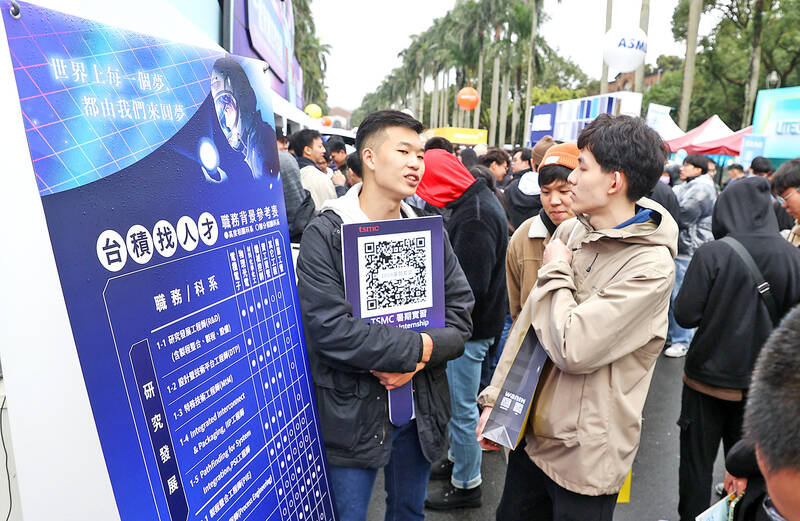Local companies believe that nearly one-third of all job opportunities would disappear in 10 years due to the rise of artificial intelligence (AI), according to the results of a survey by online job bank yes123 released on Tuesday.
In a survey of 1,016 companies on the labor market’s third quarter outlook, the job bank focused in part on AI’s impact on workers and asked companies what percentage of jobs they felt would be lost to AI’s round-the-clock productivity and high-speed computing prowess.
Respondents felt on average that 29.2 percent of job opportunities would be lost to AI over the next 10 years, but there were no suggestions on what would replace those jobs.

Photo: CNA
The job bank also asked companies to identify the labor-intensive and knowledge-intensive fields which people were most likely to lose their jobs to AI.
Companies said the most likely job to disappear among labor-intensive industries was ticket selling, cited by 54.3 percent of respondents.
It was followed by call center agents (53.6 percent), assembly line workers (52.2 percent), gas station attendants (35.7 percent), and wholesale and convenience store clerks (34.8 percent).
The top five knowledge-intensive jobs likely to disappear the polled companies said were translators (37.2 percent), journalists (36.3 percent), bank clerks (35.2 percent), financial traders (29.1 percent) and insurance agents (28.2 percent).
In addition, 49.8 percent of companies said they are considering adopting automation or AI, a significant increase from last year’s survey result of 42 percent, yes123 said.
Among them, 19.6 percent said that related AI projects are already in progress, with expectations that employees possessing relevant skills would have an average starting salary of at least 31.6 percent higher than others.
Bingo Yang (楊宗斌), a spokesman for yes123, said the job market was heading toward “human-machine collaboration,” or workers directly supported by AI to achieve objectives.
That way, AI can handle tasks that require high precision and repetition, allowing workers to engage in more creative work, Yang said.
The online survey, which was conducted from June 7 to June 20, had a confidence level of 95 percent and a margin of error of 3.07 percent, yes123 said.

Nvidia Corp chief executive officer Jensen Huang (黃仁勳) on Monday introduced the company’s latest supercomputer platform, featuring six new chips made by Taiwan Semiconductor Manufacturing Co (TSMC, 台積電), saying that it is now “in full production.” “If Vera Rubin is going to be in time for this year, it must be in production by now, and so, today I can tell you that Vera Rubin is in full production,” Huang said during his keynote speech at CES in Las Vegas. The rollout of six concurrent chips for Vera Rubin — the company’s next-generation artificial intelligence (AI) computing platform — marks a strategic

REVENUE PERFORMANCE: Cloud and network products, and electronic components saw strong increases, while smart consumer electronics and computing products fell Hon Hai Precision Industry Co (鴻海精密) yesterday posted 26.51 percent quarterly growth in revenue for last quarter to NT$2.6 trillion (US$82.44 billion), the strongest on record for the period and above expectations, but the company forecast a slight revenue dip this quarter due to seasonal factors. On an annual basis, revenue last quarter grew 22.07 percent, the company said. Analysts on average estimated about NT$2.4 trillion increase. Hon Hai, which assembles servers for Nvidia Corp and iPhones for Apple Inc, is expanding its capacity in the US, adding artificial intelligence (AI) server production in Wisconsin and Texas, where it operates established campuses. This

US President Donald Trump on Friday blocked US photonics firm HieFo Corp’s US$3 million acquisition of assets in New Jersey-based aerospace and defense specialist Emcore Corp, citing national security and China-related concerns. In an order released by the White House, Trump said HieFo was “controlled by a citizen of the People’s Republic of China” and that its 2024 acquisition of Emcore’s businesses led the US president to believe that it might “take action that threatens to impair the national security of the United States.” The order did not name the person or detail Trump’s concerns. “The Transaction is hereby prohibited,”

Garment maker Makalot Industrial Co (聚陽) yesterday reported lower-than-expected fourth-quarter revenue of NT$7.93 billion (US$251.44 million), down 9.48 percent from NT$8.76 billion a year earlier. On a quarterly basis, revenue fell 10.83 percent from NT$8.89 billion, company data showed. The figure was also lower than market expectations of NT$8.05 billion, according to data compiled by Yuanta Securities Investment and Consulting Co (元大投顧), which had projected NT$8.22 billion. Makalot’s revenue this quarter would likely increase by a mid-teens percentage as the industry is entering its high season, Yuanta said. Overall, Makalot’s revenue last year totaled NT$34.43 billion, down 3.08 percent from its record NT$35.52